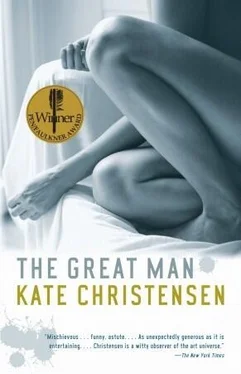As she was cleaning a jar’s worth of sable brushes soaking in turpentine, her cell phone trilled the little melody it had come programmed with, a cascading tumble of tinkly notes. At first, she heard it as part of Conference of the Birds and ignored it; then suddenly the phone’s chirps separated themselves aurally from the music and she realized someone was calling her.
Katerina!
She put the brush down, took the lit cigarette from between her lips and stubbed it out in a nearby ashtray, fished the phone from her back pocket, and checked the little screen on the cover. It wasn’t Katerina; it was a number she didn’t recognize. She said, “Fuck,” flipped it open, and said, “Yeah.”
“Maxine Feldman?” said a hesitant male voice.
“That’s me.”
“This is Henry Burke, your brother’s biographer?”
A lot of professional white men under the age of about forty-five, Maxine had noticed lately, were doing something that a few decades before had been the clichéd provenance of Valley girls, ending declarative sentences with a question mark. But unlike those prepubescent mall rats, they weren’t verbally sequestering themselves in a trendy colloquial clique; they were trying to declaw and deball themselves by appearing as unthreatening and sensitive as possible. Blatant masculinity was, unfortunately, out of favor.
“Henry,” said Maxine. She’d liked him well enough when she’d met him, despite his blandness. She might have felt differently about him if he hadn’t been lucky enough to contrast favorably with that other one, Rupert or Rufus, that pompous shwartze with his chummy condescension. He’d seemed to think that by subtly allying himself with Maxine and flattering her, he could win her over and get her to reveal things about Oscar that weren’t already a matter of public record. She could smell a mile off that he was only trying to bamboozle her by capitalizing on his knowledge of the rift between her and her brother. Ralph, his name was, she remembered then. Ralph’s little game of being “on her side” had conveyed the implication that it was generally understood that Oscar’s side had been diametrically and personally opposed to hers. This irked her no end. She preferred Henry’s strategy, which was to be openly worshipful of Oscar and wary of her: Maxine tended to feel more at ease with people who didn’t seem to like her than with those who tried to collude with her.
Not that these boys were going to get anything interesting out of her. She had decided to appear cooperative and sweet as pie, but to tell no one a damn thing he couldn’t learn by spending some quality time on Google. “Oscar was a confident and boisterous kid, whereas I was more shy and studious,” and “Oscar was never happy in art school — he was too rebellious — and that’s why he dropped out after one semester,” and “From a very early age, maybe even birth, Oscar loved his power to charm women,” that sort of claptrap. She had announced these things first to Henry, then to Ralph, with a confidential air meant to suggest that she was sharing secrets. Maxine hated the whole idea of someone writing Oscar’s biography. Part of it was her general distrust of the biographical venture and part of it was sibling rivalry — profiles in art periodicals aside, no one had written a full-length biography of Maxine yet, and here were two being written about Oscar! But he’d had to die first, so she supposed it was a fair trade-off.
“I was wondering,” Henry was saying, “whether I could come by today. If you’re not too busy?”
“Well, I’m busy now and there’s a dinner party I have to go to later on,” Maxine said then. “Come at five. That should give us plenty of time.”
Henry started to tell her that was the worst-possible time for him to come, because his wife had asked him to stay home with Chester from 4:00 to 5:30 P.M. so she could go to a yoga class.
“Better make it four-thirty, so I have time to bathe and dress,” Maxine said, interrupting him. “See you then. Good-bye.” She shoved the phone back into her pocket and stalked over to the window, harrumphing a little as she lit a fresh cigarette. She was not in any mood to entertain today. When Frago lurched to his feet and ambled to her side, she bent down and took one of his silky ears in her hands. “Frago Fragonardo Fragonard,” she crooned. “My sweetest pea, my sweet good boy. Who’s my sweet pea?” Frago looked into her face, his eyes seemingly devoted but, Maxine knew, totally unfathomable. Even so, she felt an answering well of love for him as pure as any feeling she’d ever had. On their walk this morning, she’d lost her temper with him. She liked to feed him his breakfast kibble as they walked, instead of giving it to him in a bowl; even after all these years, he’d never learned to heel very well without a steady stream of bribes, and she no longer had the strength to restrain him if he pulled too hard. Sometimes her fingers and his mouth suffered a misunderstanding, and today had been one such time: She’d held the kibble too deeply in her bunched fingertips, so his teeth had had to sink into her fingers so he could tongue it from her grasp. It had hurt her, but usually this passed without remark from Maxine, since they were both too old to learn otherwise. Today, however, the indignity of being bitten by her own dog as she was feeding him had been too much to stand. “Fuck you,” she’d muttered, giving his muzzle a quick squeeze, so hard that he’d squealed. Just then, she’d met the eye of the Korean woman in front of the deli on the corner. For some reason, every time this woman saw Maxine, she happened to be in the grip of her worst self: haggling over the price of coffee, falsely accusing the cashier of shortchanging her…. This terrible, low morning, caught in the woman’s gaze, Maxine had felt herself at once reduced to the evolutionary status of a slug.
“Frago,” Maxine crooned now. He nuzzled her hand with the same nose she’d squeezed to the point of pain; she wished the Korean woman could see him now. Outside, the street below was still fairly empty, but before too long it would be thronged with the usual slow-moving herds of tourists and outer-borough nimrods buying three-hundred-dollar pairs of shoes and low-level TV stars and other horrible people. Maxine’s loft, which she’d bought for “nothing” (actually, $27,000) in the seventies, was on the fourth floor of an old factory on Greene Street. Most of the old SoHo artists had long ago fled to Brooklyn or Chelsea and been replaced by male models, Eurotrash, and bond traders, but Maxine had stayed, stubbornly. Where was she supposed to go, anyway? For about the past ten years, sales of her work had pretty much been in the crapper, but she had saved enough from the flush eighties to keep her going, she hoped, till she croaked.
Maybe, it occurred to her now, these biographies of Oscar would shed a little secondary light on her….
Oh God, she was going to die alone.
Maxine mashed her smoked-down filter into an ashtray and went back to the brushes. By the time Henry was due to arrive, her worktable was austerely clean, the floor mopped, paints and brushes, tools and inks perfectly organized. She’d sorted through a lot of new sketches and drawings and put them away in flat files, emptied months’ worth of jars full of gray turpentine, and even scrubbed the little toilet in the tiny hallway. Katerina always offered to clean the studio, but letting someone else clean in here felt intrusive and stressful to Maxine, even Katerina, who kept the rest of the loft beautifully tidy and mopped.
Maxine waited in her kitchen for the water to boil for Earl Grey, put some gingersnaps out on a plate, then noticed she was out of milk. Well, Henry would just have to drink it without. She had never been much for entertaining; she always invited people to show up between mealtimes so she wouldn’t be called upon to provide food.
Читать дальше












